GMRC Review: Suldrun’s Garden by Jack Vance
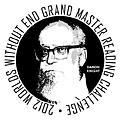 Guest Blogger, Allie McCarn, reviews science fiction and fantasy books on her blog Tethyan Books. She has contributed many great book reviews to WWEnd and has generously volunteered to write some periodic reviews for our blog.
Guest Blogger, Allie McCarn, reviews science fiction and fantasy books on her blog Tethyan Books. She has contributed many great book reviews to WWEnd and has generously volunteered to write some periodic reviews for our blog.
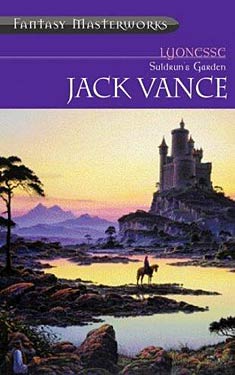 Lyonesse: Suldrun’s Garden by Jack Vance
Lyonesse: Suldrun’s Garden by Jack Vance
Published: Berkeley Publishing Group, 1983
Series: Book 1 of the Lyonesse Trilogy
Awards Nominated: Nebula Award, Locus Fantasy Award, and World Fantasy Award
The Book:
“The Elder Isles, located in the modern-day Bay of Biscay, contain a number of independent, often contentious, kingdoms. Some of kingdom’s monarchs have an eye towards unifying the entire region under a single rule. One of these ambitious rulers is King Casmir of Lyonesse, who is determined to use anyone and anything he can to conquer the other islands. For the most part, his ambition gains him only powerful enemies and war.
It is Casmir’s pretty, powerless, neglected daughter Suldrun, however, whose sad life sets a wide-reaching tale in motion Though most of the excitement and magic is experienced by others, the start of it all can be traced back to Suldrun’s peaceful, isolated garden. In these kingdoms full of violence, war, magic, ogres and fairies, there are plenty of adventures—good and bad—to be had by young princes, cruel rulers, and powerful sorcerers.” ~Allie
GMRC Review: The Languages of Pao by Jack Vance
 Long time WWEnd member and Uber User, Emil Jung, is an obsessive SF/F reader and as such he’s become a huge supporter of WWEnd. (We often refer to him as our “South African Bureau.”) Besides hanging out here, Emil writes poetry on his blog emiljung.posterous.com. This is the sixth of Emil’s GMRC reviews to feature in our blog.
Long time WWEnd member and Uber User, Emil Jung, is an obsessive SF/F reader and as such he’s become a huge supporter of WWEnd. (We often refer to him as our “South African Bureau.”) Besides hanging out here, Emil writes poetry on his blog emiljung.posterous.com. This is the sixth of Emil’s GMRC reviews to feature in our blog.
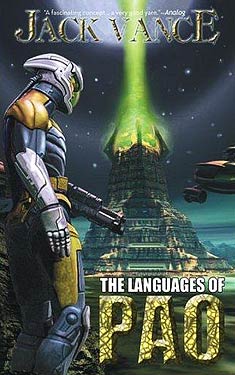 First, a confession. I have not before this book read any of Jack Vance‘s novels. Even so I’m well aware of the fact that he has long been regarded as a very accomplished creator of planetary romances and “dying Earth” fantasies, of which many fine reviews have been submitted for the GMRC. Most reviewers laud his genius for coining memorable and believable nouns for unearthly beings and artefacts, all the more solidying successful attempts to create memorable, spellbinding worlds impregnated with Damon Knight‘s sense of wonder. In The Languages of Pao Vance has created another clever, original adventure story, radiating with verbal and world-building skills. As this is the only Vance I’ve read, I can’t compare its magniloquence and style with other work, but can state that it certainly has enticed me to read more from his corpus.
First, a confession. I have not before this book read any of Jack Vance‘s novels. Even so I’m well aware of the fact that he has long been regarded as a very accomplished creator of planetary romances and “dying Earth” fantasies, of which many fine reviews have been submitted for the GMRC. Most reviewers laud his genius for coining memorable and believable nouns for unearthly beings and artefacts, all the more solidying successful attempts to create memorable, spellbinding worlds impregnated with Damon Knight‘s sense of wonder. In The Languages of Pao Vance has created another clever, original adventure story, radiating with verbal and world-building skills. As this is the only Vance I’ve read, I can’t compare its magniloquence and style with other work, but can state that it certainly has enticed me to read more from his corpus.
The focus of the novel is on linguistics, built around a plot structure powered by the idea of vocabulary as humankind’s means of progress, but despite the seemingly high concept nature of the story, it’s far from an academic read. It starts off with an assassination of Panarch Panasper, apparently by his son Beran. It’s all a clandestine conspiracy by Beran’s uncle Bustamonte, who becomes the Regent while Beran himself is spirited away to Breakness, a world dominated by the Wizards of the Institute, males with cunning intellects that are only matched by their cybernetic augmentations, which bestow them with superpowers. Beran’s benefactor Palofax is the most augmented man on Breakness, and under his tutelage Beran grows to manhood while studying linguistics. From the outset Bustamonte’s reign is beset with difficulties, and Pao is easily conquered by raiders from the planet Batmarsh and forced to pay substantial annual tributes. Bustamonte travels to Breakness to secure help from Palofax, who has his own designs on Pao. They agree that a new breed of Paonese is required, because until then Pao has largely been a rural population that was culturally, linguistically and politically identical. Even in their language the Paonese were conspicuously docile and dispassionate and devoid of a fighting spirit. It’s inexplicable how a planet with 15 billion souls could be so easily overcome by a mere 10,000! Palofax is intent on changing the psychological foundation of Pao, which begins with the Paonese language:
Forays into Fantasy: The Dying Earth by Jack Vance
Scott Lazerus is a Professor of Economics at Western State College in Gunnison, Colorado, and has been a science fiction fan since the 1970s. Recently, he began branching out into fantasy, and was surprised by the diversity of the genre. It’s not all wizards, elves, and dragons! Scott’s new blog series, Forays into Fantasy, is an SF fan’s exploration of the various threads of fantastic literature that have led to the wide variety of fantasy found today. FiF will examine some of the most interesting landmark books of the past, along with a few of today’s most acclaimed fantasies, building up an understanding of the connections between fantasy’s origins, its touchstones, and its many strands of influence.
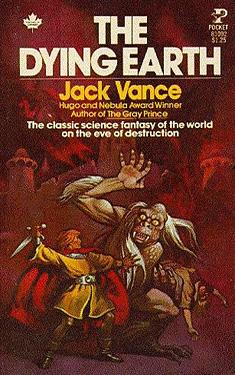 Jack Vance creates a subgenre: The Dying Earth
Jack Vance creates a subgenre: The Dying Earth
The work of Grand Master Jack Vance can be segmented into science fiction and fantasy (actually, he wrote some mysteries, too), but they all straddle the borderline between the two genres. Both his fantasy, beginning with The Dying Earth (1950), and his science fiction, beginning with Big Planet (1952), can be seen as the earliest of the modern “planetary romances” – stories set on alien worlds, with plots involving exploration of the sociological and anthropological aspects of these worlds. An important precursor is Clark Ashton Smith, whose tales were often set in far future settings where “technology is indistinguishable from magic,” to borrow Arthur C. Clarke‘s maxim. Leigh Brackett‘s stories of Mars and Venus, in turn influenced by Edgar Rice Burroughs, are also important early examples. These stories are not hard science fiction – the nature of the technology is not a focus of the stories, and there are no technological problems to understand or solve. But they are not pure fantasy either, since they are set on alien worlds or in the far future of Earth, and may include the trappings of SF such as spaceships and aliens.
GMRC Review: Emphyrio by Jack Vance
 Daniel Roy (triseult), has contributed over 30 reviews to WWEnd including this, his second, for the GMRC. Daniel is living his dream of travelling the world and you can read about some of his adventures on his blog Mango Blue.
Daniel Roy (triseult), has contributed over 30 reviews to WWEnd including this, his second, for the GMRC. Daniel is living his dream of travelling the world and you can read about some of his adventures on his blog Mango Blue.
Editor’s Note: This is a May GMRC review that we didn’t get around to posting in time.
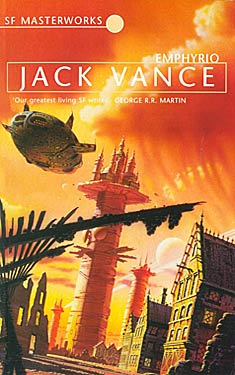 The great Jack Vance is sometimes described as a “gardener of worlds”, a description that encompasses much of the strength of Emphyrio. But unfortunately, for all the brilliant world-building, the novel lacks a certain dramatic tension, as well as a real appeal for the world it portrays.
The great Jack Vance is sometimes described as a “gardener of worlds”, a description that encompasses much of the strength of Emphyrio. But unfortunately, for all the brilliant world-building, the novel lacks a certain dramatic tension, as well as a real appeal for the world it portrays.
The world of Emphyrio is interesting, but strangely placid. There are otherworldly lords and ladies, and puppet-makers who build puppets of the flesh. There are spaceships and a plethora of worlds. But most of the story takes place on a small world of artisans, away from the most interesting aspects of Vance’s creation. Vance, instead, focuses on the workings of a “welfare society”, where artisans, deprived of any reproduction method whatsoever, must create beautiful works of art by hand, in order to receive a living wage.
The society Vance describes is interesting, but not very dramatic. There is a sense that this place is unjust and something of a repressive environment for the protagonist, Ghyl, and his father; but the form of repression they live through is pretty mild and unthreatening. There is no outburst of violence, no sense of impending doom; just a quiet rebellion against the ordained march of days of a woodcarver and his son.
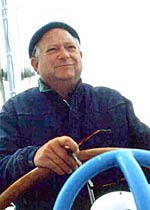 Likewise, Ghyl is not a fascinating protagonist. His obsession with a fragment of the legend of Emphyrio, and his slow draw away from his destiny as a woodworker, is well-written, but lacks dramatic tension. Action takes a long time to happen, and when it does, it doesn’t depict Ghyl in a very positive light. We’re meant to feel for him for being a noble outlaw, but I just found him easily manipulated, and too idealistic to realize the consequences of his criminal actions.
Likewise, Ghyl is not a fascinating protagonist. His obsession with a fragment of the legend of Emphyrio, and his slow draw away from his destiny as a woodworker, is well-written, but lacks dramatic tension. Action takes a long time to happen, and when it does, it doesn’t depict Ghyl in a very positive light. We’re meant to feel for him for being a noble outlaw, but I just found him easily manipulated, and too idealistic to realize the consequences of his criminal actions.
Overall, Emphyrio is well-written, and presents an original, evocative world. But the story told in this world lacks a punch that would make it as memorable as, say, To Live Forever.
Fire or Ice?

Some say the world will end in fire,
Some say in ice.
From what I’ve tasted of desire
I hold with those who favor fire.
But if it had to perish twice,
I think I know enough of hate
To say that for destruction ice
Is also great,
And would suffice.
– Robert Frost
As you may or may not know by now, today is the last day…. ever. At least, that’s what Harold Camping and the Family Radio network have been preaching since the last armaggedon failed to appear in 1994. Since this may be our final blog post on this earth, we thought it might be a good time to remember other predictions of our impending doom. Perhaps we can finally settle the question posed by the good Robert Frost a mere 88 years ago. Will the world end in fire or ice?
First up: Walter Miller. His Hugo winning novel A Canticle for Leibowitz is a personal favorite of mine (as you can tell from my avatar). In it, the world undergoes a nuclear holocaust, plunging humanity back into the dark ages where the only shreds of written knowledge are preserved by ascetic monks in the southwestern deserts of North America. 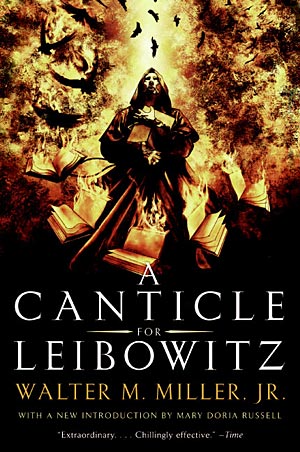 This classic features not one but two armageddons, illustrating the futility of technological conflict. He wrote the book as a sort of penance for his involvement in the destruction of Montecassino during World War II. The event left such a scar on his psyche that only beating out this masterpiece could quell it. Miller’s vote: FIRE.
This classic features not one but two armageddons, illustrating the futility of technological conflict. He wrote the book as a sort of penance for his involvement in the destruction of Montecassino during World War II. The event left such a scar on his psyche that only beating out this masterpiece could quell it. Miller’s vote: FIRE.
Jack Vance invented the “Dying Earth” sub-genre with his novel, The Dying Earth. Unrecognized in his time, the trendsetting novel has been named one of The Classics of Science Fiction and is included in the Fantasy Masterworks list by the Orion Publishing Group. This Earth of the distant future revolves around a red giant that is inexorably dying out. Like the sun, the human race is also a dim reflection of its former self, relying on the remnants of forgotten technology and magic. 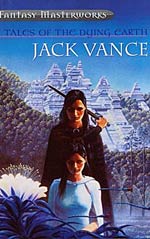 Vance was known for the mixing of science fiction and fantasy, and the trope of a massive but cooling sun dominating a now red sky provides a fantastic backdrop for both genres. Though the planet is not quite destroyed in this 1960’s series, its inevitable fate is known. Jack Vance votes ICE. (P.S.: I’ve always wondered whether Jack Vance was the inspiration for Vance Refrigeration in The Office.)
Vance was known for the mixing of science fiction and fantasy, and the trope of a massive but cooling sun dominating a now red sky provides a fantastic backdrop for both genres. Though the planet is not quite destroyed in this 1960’s series, its inevitable fate is known. Jack Vance votes ICE. (P.S.: I’ve always wondered whether Jack Vance was the inspiration for Vance Refrigeration in The Office.)
Rarely do we get to see the Earth actually die in a science fiction novel. Sure, it might sustain a few nuclear wars or a couple of extinction events, but it’s hard to continue a story when all of your characters are dead. You can imagine my delight, then, when I re-read H.G. Wells‘ The Time Machine. Sure, everyone rememebers the Morlocks and the Eloi. You might still have a few whispy dreams of the lovely Weena, the Time Travellers demure girlfriend from the year 802,701 A.D. What I forgot, however, was the protagonists final trip to the ends of the Earth (literally). For those who are a little foggy on the details, we’ll fill you in. After rescuing his shorty, the Time Traveller travels another 30 million years into the future, where he witnesses crabs and butterflies sparsely inhabiting blood-red world of simple vegetation. A few jumps later gives us the answer we seek: the Earth’s rotation stops and the sun shrinks away until the earth and everything in it sets in for a deep freeze. For Mr. Wells, that’s a definite ICE.
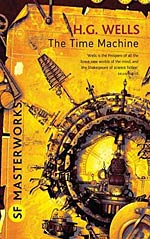
A few other WWEnd author votes include:
Gene Wolfe votes ICE with his classic series, The Book of the New Sun, which describes an “Urth” in a distant future whose sun is dying.
The great Larry Niven begs FIRE in a big way with Lucifer’s Hammer, where the planet gets smacked with a (near) extinction event in the form of an asteroid.
If you want a definitive answer to the way the world ends, you can’t get any closer than This is the way the World Ends, by James Morrow. He nabbed nominations for both the Nebula and Campbell awards, casting his vote for FIRE by way of a nuclear war.
This leaves us with a tie of 3-3, but what do I know? I just picked six books at random. Please add to the list by citing your favorite WWEnd authors, or even authors not yet in our database. Hell, cast your own vote. We just need to break this tie. Please hurry, though. We only have until 6PM before the latest scheduled apocalypse.



















 Full Details
Full Details

